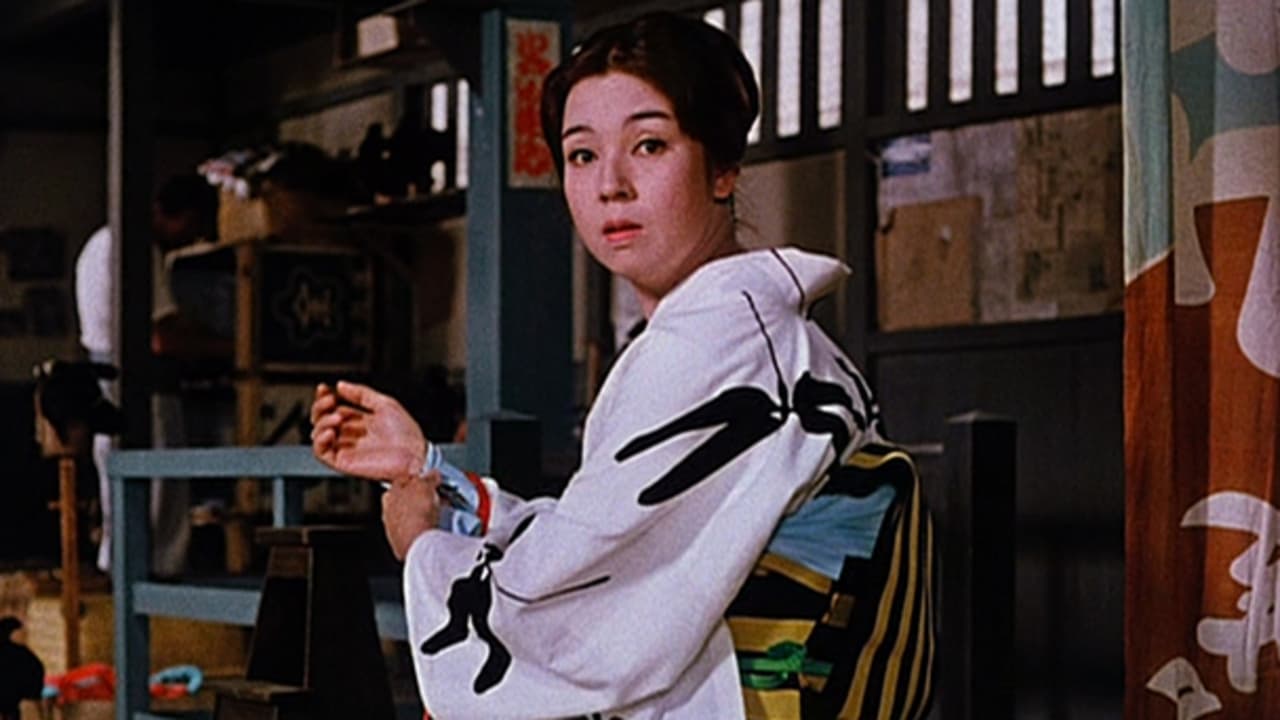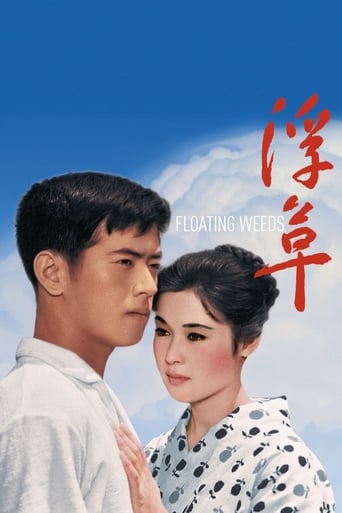Kattiera Nana
I think this is a new genre that they're all sort of working their way through it and haven't got all the kinks worked out yet but it's a genre that works for me.
StunnaKrypto
Self-important, over-dramatic, uninspired.
Ensofter
Overrated and overhyped
Lancoor
A very feeble attempt at affirmatie action
Andres Salama
Floating Weeds from 1959 is a film from Yasujiro Ozu's final period, and also one of his first in color. He told the story before, in 1934, only that was a black and white silent film. But he followed the plot of the first film very closely.The story has a mediocre traveling Kabouki troupe reaching a small port village in Southern Japan to perform. Their performances only attract a few townspeople, but to Komajuro (Ganjiro Nakamura), the troupe's leader, the visit is an important occasion to meet his old lover, Oyoshi (Haruko Sugimura) and their grown child Kiyoshi (Hiroshi Kawaguchi), who is about to enter college and believes Komajuro is his uncle. When Komajuro's current lover, the pretty Sumiko (Machiko Kyo) learns about this, she blows in rage, and persuades another actress of the troupe, the pretty Kayao (Ayako Wakao) to seduce Kiyoshi. Kayao succeeds in the mission, so much so that she falls in love with Kiyoshi. When Komajuro learns about their relation, he doesn't take it so well (Komajuro repeatedly beating Sumiko and Kayo while shouting to them "you slut" are scenes that would probably not be filmed today), especially since he wants his son to have a life above that of a traveling acting troupe.This is not the very best of Ozu (I put the so called Noriko trilogy there, one of the crowning heights of cinema) but is still very good. There are a lot of Ozu's characteristic style to watch here (the camera put at a knee's height, the so called pillow shots, etc). The movie includes a famous scene with Komajuro and Sumiko fighting and arguing over a street where the rain is pouring. The performances are terrific, especially those of Nakamura and Kyo. Chishu Ryu, who was in dozens of Ozu's films, has a bit role here as the theater manager.
Jackson Booth-Millard
I knew that this Japanese film was listed in the book 1001 Movies You Must See Before You Die, but I didn't know some of the critics did not rate it very highly, I saw one review giving it two stars out of five, so with the book inclusion was interested to see what I would think, from director Yasujirô Ozu (Tokyo Story, An Autumn Afternoon). Basically, set in the summer of 1958, at a seaside town in the Inland Sea, there is the arrival of a troupe of travelling players, headed by lead actor and owner Komajuro Arashi (Ganjirô Nakamura) the other players promote their acts. Komajuro goes to visit old flame Oyoshi (Haruko Sugimura) who had a son with him, Kiyoshi Homma (Hiroshi Kawaguchi), but the grown up son who works in the post office believes the visitor is his uncle, not his father. Komajuro's current mistress and lead actress Sumiko (Machiko Kyô) becomes jealous of her lover being with his old flame, and so that she cannot say anything to ruin him he takes her away and breaks up with her. To get some kind of revenge Sumiko pays fellow pretty and young troupe actress Kayo (Ayako Wakao) to seduce Kiyoshi, after initially refusing she does give in to this, and in the long time they spend together she does actually fall for the son, and she tells him the truth, he says it does not matter. Komajuro confronts Kayo when he finds out the couple are engaged, she says it is no longer for money from Sumiko, and angry he goes to talk to Sumiko, who refuses any kind of reconciliation, and with business bad he decides to break up the troupe and for them to play one last night. Oyoshi persuades him that if he is leaving soon that he should tell Kiyoshi about his true parentage, he agrees, but angry to see him and Kayo together he has a violent moment and beats them both, and he leaves without saying much at all. Kiyoshi is prepared to talk to and forgive Komajuro, but he leaves before he gets the opportunity, and on the train Komajuro happens upon Sumiko who has nowhere to go, so they reconcile and decide to go to Kuwana together. Also starring Kôji Mitsui as Kichinosuke and Chishû Ryû as Theatre Owner. The cast and the direction was fine, I can see why critics say it is the less memorable of the films from Ozu, it is not a terrible film, but is certainly does not have much interesting material, besides the unknown father and son storyline I was not always paying attention, so overall it is a moderately alright drama film. Okay!
kenjha
A theatre troupe comes to a coastal town in Japan, including the leader of the troupe who had previously visited twenty years earlier and fathered a child with a local woman. It starts off with too many characters engaged in random conversations. Although it takes a while for the main story line to emerge, the film becomes more interesting once it gets to that point. As one would expect from Ozu, the acting here is generally good if somewhat theatrical. The cinematography is quite colorful, helped by the picturesque seaside setting. Unfortunately, the plot is rather mundane and melodramatic, with themes of seduction and infidelity more suited to a trashy Hollywood movie.
Ali Catterall
Ageing, washed-up actor Komajuro (Nakamura) rolls into a sleepy 50s seaside town with his rinky-dink, outdated Kabuki troupe (the film's title being a Japanese term for itinerant actors). Here he seeks to reunite with former lover Oyoshi (Sugimura) and their illegitimate son Kiyoshi (Kawaguchi), who believes the old man is his uncle.When Komajuro's sour-faced mistress Sumiko (Kyô) learns of the affair, she engineers a doomed seduction between beautiful young actress Kayo (Wakao) and Kiyoshi to humiliate the troupe master via his unwitting son - Kiyoshi's tawdry, failed romance will serve to remind Komajuro of his own. Can Komajuro exert parental authority over his 'nephew' without revealing his true identity? Tokyo Story may be Ozu's most famous work, but the elegiac and refined Floating Weeds ranks among the director's best. A director, incidentally, whose gravestone is marked by the Japanese word for "nothing". Appropriately so: as critic Derek Malcolm points out, such was the restraint of Ozu's film-making, "it hardly seemed like art at all".Less is so much more. As Ozu biographer Donald Richie notes: "What remains after seeing an Ozu film is the feeling that, if only for an hour or two, you have seen the goodness and beauty of everyday things and everyday people." Floating Weeds may well concern issues of betrayal and loss, but in its refusal to moralise, affords its all-too-human characters something approaching grace. Prefaced with the fairytale like caption "Somewhere in the South of Japan...", Weeds goes about its business with a quiet dignity - chiefly distinguished by Ozu's celebrated static camera, allowing a richer degree of intimacy and contemplation.This is complemented by exquisite framing from cinematographer Kazuo Miyagawa - evoking 19th century Japanese prints - and dedicated, understated performances from the cast.

